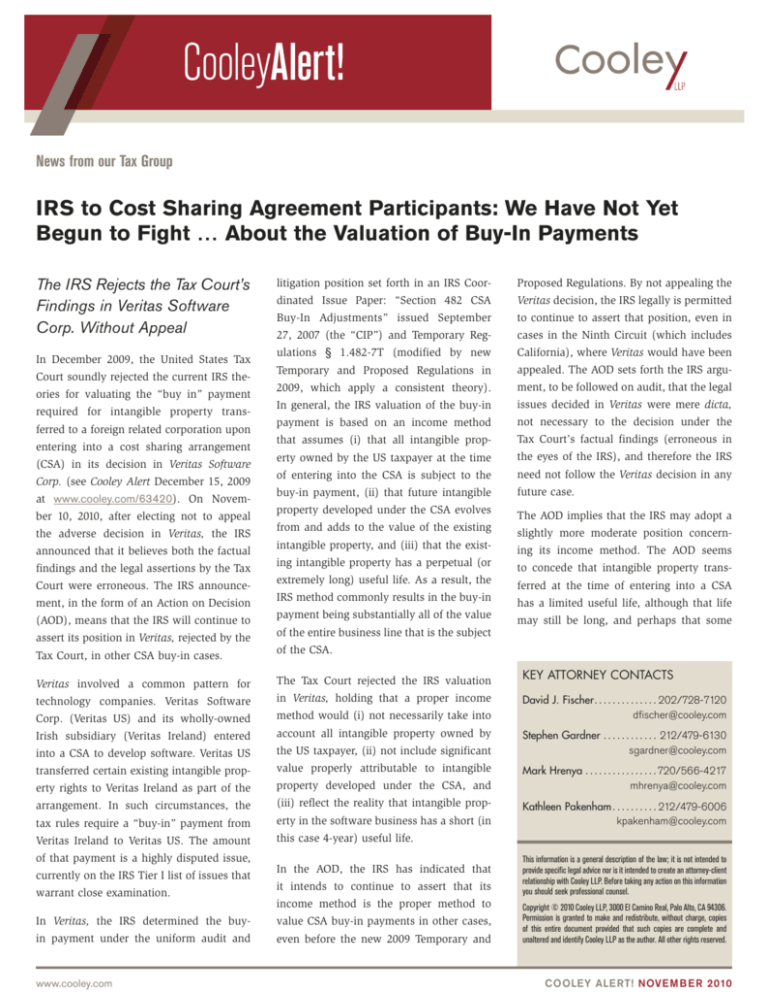
CooleyAlert!
News from our Tax Group
IRS to Cost Sharing Agreement Participants: We Have Not Yet
Begun to Fight … About the Valuation of Buy-In Payments
The IRS Rejects the Tax Court’s
Findings in Veritas Software
Corp. Without Appeal
In December 2009, the United States Tax
Court soundly rejected the current IRS theories for valuating the “buy in” payment
required for intangible property transferred to a foreign related corporation upon
entering into a cost sharing arrangement
(CSA) in its decision in Veritas Software
Corp. (see Cooley Alert December 15, 2009
at www.cooley.com/63420). On November 10, 2010, after electing not to appeal
the adverse decision in Veritas, the IRS
announced that it believes both the factual
findings and the legal assertions by the Tax
Court were erroneous. The IRS announcement, in the form of an Action on Decision
(AOD), means that the IRS will continue to
assert its position in Veritas, rejected by the
litigation position set forth in an IRS Coor-
Proposed Regulations. By not appealing the
dinated Issue Paper: “Section 482 CSA
Veritas decision, the IRS legally is permitted
Buy-In Adjustments” issued September
to continue to assert that position, even in
27, 2007 (the “CIP”) and Temporary Reg-
cases in the Ninth Circuit (which includes
ulations § 1.482-7T (modified by new
California), where Veritas would have been
Temporary and Proposed Regulations in
appealed. The AOD sets forth the IRS argu-
2009, which apply a consistent theory).
ment, to be followed on audit, that the legal
In general, the IRS valuation of the buy-in
issues decided in Veritas were mere dicta,
payment is based on an income method
not necessary to the decision under the
that assumes (i) that all intangible prop-
Tax Court’s factual findings (erroneous in
erty owned by the US taxpayer at the time
the eyes of the IRS), and therefore the IRS
of entering into the CSA is subject to the
need not follow the Veritas decision in any
buy-in payment, (ii) that future intangible
future case.
property developed under the CSA evolves
from and adds to the value of the existing
intangible property, and (iii) that the existing intangible property has a perpetual (or
extremely long) useful life. As a result, the
IRS method commonly results in the buy-in
payment being substantially all of the value
of the entire business line that is the subject
Tax Court, in other CSA buy-in cases.
of the CSA.
Veritas involved a common pattern for
The Tax Court rejected the IRS valuation
technology companies. Veritas Software
in Veritas, holding that a proper income
Corp. (Veritas US) and its wholly-owned
method would (i) not necessarily take into
Irish subsidiary (Veritas Ireland) entered
account all intangible property owned by
into a CSA to develop software. Veritas US
the US taxpayer, (ii) not include significant
transferred certain existing intangible prop-
value properly attributable to intangible
erty rights to Veritas Ireland as part of the
property developed under the CSA, and
arrangement. In such circumstances, the
(iii) reflect the reality that intangible prop-
tax rules require a “buy-in” payment from
erty in the software business has a short (in
Veritas Ireland to Veritas US. The amount
this case 4-year) useful life.
of that payment is a highly disputed issue,
currently on the IRS Tier I list of issues that
warrant close examination.
In the AOD, the IRS has indicated that
it intends to continue to assert that its
income method is the proper method to
In Veritas, the IRS determined the buy-
value CSA buy-in payments in other cases,
in payment under the uniform audit and
even before the new 2009 Temporary and
www.cooley.com
The AOD implies that the IRS may adopt a
slightly more moderate position concerning its income method. The AOD seems
to concede that intangible property transferred at the time of entering into a CSA
has a limited useful life, although that life
may still be long, and perhaps that some
Key Attorney Contacts
David J. Fischer. . . . . . . . . . . . . . 202/728-7120
dfischer@cooley.com
Stephen Gardner . . . . . . . . . . . . . 212/479-6130
sgardner@cooley.com
Mark Hrenya. . . . . . . . . . . . . . . . 720/566-4217
mhrenya@cooley.com
Kathleen Pakenham. . . . . . . . . . 212/479-6006
kpakenham@cooley.com
This information is a general description of the law; it is not intended to
provide specific legal advice nor is it intended to create an attorney-client
relationship with Cooley LLP. Before taking any action on this information
you should seek professional counsel.
Copyright © 2010 Cooley LLP, 3000 El Camino Real, Palo Alto, CA 94306.
Permission is granted to make and redistribute, without charge, copies
of this entire document provided that such copies are complete and
unaltered and identify Cooley LLP as the author. All other rights reserved.
Cooley Ale rt! Nove m b e r 2010
2
of the future income from the business line
is attributable to intangible property developed under the CSA. Whether this will
result in any change in IRS buy-in valuations on audit or in litigation remains to
be seen.
The IRS processing of cost sharing buyin cases slowed to a crawl while the IRS
was considering how to react to Veritas.
Now that the IRS has decided to continue
the fight, taxpayers with CSAs under audit
should expect those cases to proceed once
again. n
www.cooley.com
Cooley Ale rt! Nove m b e r 2010





